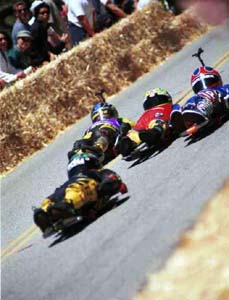![[Metroactive Features]](/features/gifs/feat468.gif)
[ Features Index | San Jose | Metroactive Central | Archives ]
Waiting to X-hale
 Chad Pilster Uncle Sam's anti-drug message strives to fit in with the times By Jim Rendon IN THE SHADOW OF THE BAY BRIDGE on San Francisco's eastern shore, dirt bikes pop up over the horizon line, appearing to cross over the Oakland hills in the distance, then descend earthward, out of view. At the 1999 X Games, the band Shootyz Groove grinds out its hip-hop metal beat near a line of small black tents. Just next to the U.S. Marines tent, where muscled spectators are egged on by cami-wearing soldiers to do chin-ups at the bar, is a tent without a crowd. Sean (no last name, please), from Santa Cruz, is drawn into the quiet venue by the clean-cut volunteers handing out shiny, free stickers. "Freevibe, Get Vertical, Not High," reads the purple-and-red lettering on the glimmering fish-lure of a sticker. He glances at the TV monitor and computer screens in the tent, flashing inaudibly against the band's loud music, then mulls over the sticker, pondering its cryptic anti-drug message. "I'm not against smoking weed or anything like that," he says, glancing over at his tattooed friend with a smile. "But with other drugs, you know, this is cool." Amid all the corporate logos, scrawled stories high on the erector-set snowboard hill, and rows of little black tents that would seem to promise one thing but offer another (like the Heineken tent giving away stickers, not beer), the Freevibe tent fits right in. It's not readily apparent from the logo, the people or the stickers what the venue is actually about. Only by examining the fine print could anyone figure out that this little black tent is part of the President's Office of National Drug Control Policy's newest, coolest effort to curb teenage drug use. But volunteers from local recovery programs and youth groups, and staffers with Fleishman-Hillard, the public relations company who put the campaign together, are confident that the Fed's new approach is working. "We've had great responses," says Connor Healy, an upbeat 21-year-old publications editor for Californians for a Drug Free Youth. "A lot of people have said it's cool that we're out here, especially the straight-edge kids." Parents and younger kids have been especially interested, he says. By 6pm on Sunday, the stickers and marijuana pamphlets are running low. Unlike past federal anti-drug campaigns which focused on stepped-up law enforcement and scare tactics, this time the federal government is trying to be a little more cool about it. The government has hidden itself behind a veil of casually dressed PR people and volunteers like Healy. There are no shiny-shoed government men yammering about marijuana making people insane, or bleating out "Just Say No." Now even some of the X Games athletes have endorsed the government's effort, speaking out against drug use between stunts on their BMX bikes. Healy and other young people taking up the anti-drug cause feel they can bring a credible message to their peers. "I talk to a lot of people who are enjoying their pot-smoking days," Healy says. "It's not my place to tell them what to do. But I want to give them information. I have trouble with people who make uninformed decisions." And even pot smokers have been receptive, he says. But not all of the government's efforts are as evenhanded and sensible as Healy's. The $200 million-a-year campaign, begun in 1997 and targeted at 9- to 18-year-olds and parents, focuses mostly on advertising and collaborations with Hollywood to put more anti-drug messages into television shows and films. The X Games tent is only a small part of the program and a stab at reaching a younger, hipper audience face-to-face. "We want to be just as real as the kids," says Robert Udowitz, the outreach supervisor. "We want to tell them it's cool to make the right decisions." But Healy seems far more adept at relating to his peers than do the ads and computer games on which the government has spent millions. When Sammy Chan, a 23-year-old student at Alameda Community College, stops by the tent and starts up the Freevibe CD ROM game, he's more amused than engaged. Clicking on a mouse, Chan watches footage of a teenage girl waking up with a hangover play on the computer monitor. She has a flashback to the night before: drinking, getting hit by a guy, throwing up. She puts her hand on her head and walks down the hall. The house is empty. Chan and his girlfriend step a little closer to the monitor. "You can't hear anything," he says loudly over the music from the band playing behind him. On the monitor, the girl goes to the front door and answers it. In walk two police officers who search her room and handcuff her. The screen turns black. As Chan and his girlfriend leave the booth, they can't help but crack a smile at the melodramatic scenario. Unfortunately, after spending millions trying to give staying clean the same appeal as a Mountain Dew, Uncle Sam can't quite keep its Reefer Madness reflex at bay. [ San Jose | Metroactive Central | Archives ]
|
From the July 1-7, 1999 issue of Metro, Silicon Valley's Weekly Newspaper.
Copyright © 1999 Metro Publishing Inc. Metroactive is affiliated with the Boulevards Network.
For more information about the San Jose/Silicon Valley area, visit sanjose.com.